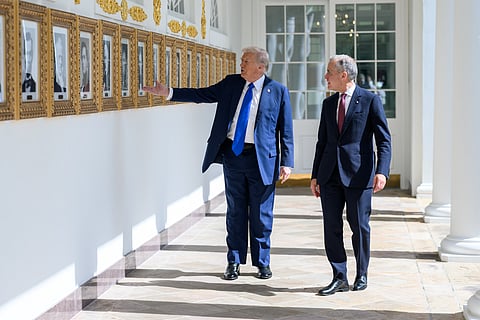

Canadian Prime Minister Mark Carney confirmed on Saturday that he had apologized to U.S. President Donald Trump for an anti-tariff advertisement featuring former President Ronald Reagan, which prompted the suspension of trade negotiations between the two nations.
Speaking to reporters after an Asia-Pacific Economic Cooperation summit in Gyeongju, South Korea, Carney described the private apology as occurring during a dinner hosted by South Korea's president on Wednesday.
The advertisement, commissioned by Ontario Premier Doug Ford, incorporated excerpts from a 1980s Reagan speech warning that tariffs could ignite fierce trade wars and lead to unemployment.
Although Carney reviewed the ad beforehand and expressed opposition to its airing, telling Ford he did not want to proceed, it was broadcast during baseball's World Series, targeting American audiences.
Trump reacted swiftly to the commercial, which his administration accused of misrepresenting Reagan's views by reordering the speech excerpts.
In response, the U.S. imposed an additional 10 percent tariff on Canadian goods and halted ongoing trade discussions, exacerbating strains in the relationship that had already soured over Trump's broader tariff initiatives.
Carney emphasized his responsibility for managing ties with Canada's largest trading partner, stating that the federal government oversees foreign relations with the United States.
Despite the gesture, Trump indicated on Friday that trade talks would not resume, though he acknowledged a positive personal rapport with Carney.
The leaders' exchange at the dinner was described by Trump as very nice, yet the president maintained that the ad was wrong and false.
Amid the trade discord, Carney highlighted progress in other diplomatic arenas during the Asia trip.
He described discussions with Chinese President Xi Jinping on Friday as a turning point after years of strained relations, marked by the detention and execution of Canadian citizens in China and allegations of election interference.
The conversation covered foreign interference among other topics, marking the first formal leader-level meeting since 2017.
Carney framed the journey as part of Canada's strategy to diversify economic dependencies away from the United States.
Last year, bilateral trade between the U.S. and Canada reached $761.8 billion in goods, underscoring the stakes involved.
Ford, meanwhile, defended the ad's impact, suggesting its effectiveness lay in provoking a national awakening.